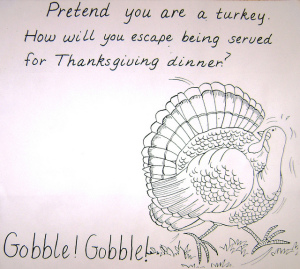This post continues with Week 4 in a series of posts on topics that relate to writer’s residencies. See also Week 1: Preparing, Week 2: Make Writing Exercises Work for You, and Week 3: In Defense of Obstinacy. I started at Week 1 and am counting up.

Now that’s creativity! CC image “Turkey Escape” via Mark Ahlness on Flickr. Some rights reserved.
Ever come across writing exercises or suggestions online, and roll your eyes?
If you’ve spent any time working through your own blocks, chances are you’ve acquainted yourself with writing resources and how-to guides, and found any number of writing prompts. They usually fall into one of two categories: a) I’ve read/done this before; and b) what am I, five?
Maybe that second one’s just me. I can get snarky when I’m feeling stuck.
The third category, c) suggestions that we haven’t seen before and that do stimulate our curiosity, are less common. Copy them down and save them somewhere, because they are GOLD.
I was recently reminded how hard good writing prompts are to find, when I started my writing exercise experiment two weeks ago (you can find more info under Week 2). In fact, the process was so annoying that I inadvertently came up with some of my own prompts.
I didn’t set out to write a how-to, a list, or to be helpful to anyone beyond myself, frankly… but there it is. If you have seen any of these elsewhere, have mercy on a writer, and keep me in the dark.
Keep your writing prompts handy
A major lesson I learned is to always have a store of writing prompts, techniques, and suggestions at the ready. When I started my first day of the writing exercise experiment, I ran into a problem. The problem — this should surprise exactly no one, and sadly did surprise me — was that I needed writing exercises to start with. I’d been under the impression that I had a few lined up, which turned out to be wrong.
Looking for writing exercises threatened to derail the experiment before I was able to start. I had set limits on my time and word count for the exercises knowing how easily I slide down the rabbit-hole and lose sight of the original goal. Right out of the gate, I proved myself and my precautions right.
Well, the horse was out of the barn. That first day, I settled for a thematic starting point as quickly as I could. The second day, I allowed myself to put together a short list, based on ideas I found from other writing sources. Emphasis on short. The second week, I allowed myself to devise my own prompts.
Super bonus points: I can use these newly-invented prompts for the second fortnight of writing exercises. Ha!
My primary focus was on exercises that allowed me to get to know my main characters. You could set up your prompts to help develop setting, theme, or another facet of craft. Some of my questions form a kind of “interview” with the characters; others give me alternate ways of playing with the material. I hope some may be useful to you.
Writing exercise prompts for characters
- Food. We can take this theme many different ways. I have a scene in a hospital, after a child is born, and I described the meal there. The neat result of this was the way my notes illuminated the setting, AND added to my understanding of the character.
- Nightmares. I’ve seen plenty of writing exercise suggestions that ask us to pursue our/our characters hopes, goals, and dreams, and I thought this would be much more fun. What terrifies your character? What does your character react to with disgust, revulsion, or otherwise find awful beyond words? Do they experience literal nightmares? What about?
- Shame. What was your character’s most embarrassing experience?
- Music. As with food, this can be taken in different directions. What is your character’s favorite music (if any)? What instrument would your character play? What if they played a different instrument? What if they were an instrument?
I also messed with techniques, because I like to jog myself out of my stylistic ruts.
Techniques to change up your writing exercises
- Reveal the answers to any of the above (or other) questions using dialogue alone. No descriptors or actions, though tags (he said, she said) are allowed.
- Write (or re-write) a scene as a play or screenplay (dialogue and stage directions). This is useful if you find yourself stuck creating action in the narrative.
- Your character is being interviewed for the local newspaper. Write the article that results from that interview.
- Your character has won an award. What for? Describe the presentation/acceptance of the award.
- Write about your character as though they were the opposite sex. To make this extra difficult, choose one scene where they MUST be female or male (because we are confined by biological realities), and change the gender. Don’t just switch pronouns! Be honest with this and you may weirdly discover a whole other character (not to mention plot)!
My new problem is that now that I’ve gotten started on this meta-writing path, I’m in danger of developing so much new material, I already want to pretend the revision process does not exist.
What is your favorite way to stoke the creative fires?



